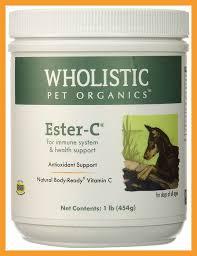VITAMIN C FOR DOGS


Most of us know the importance for vitamin C for ourselves, but do you know the importance of it and the health of your dog?
What do you need to know about Vitamin C and how much should be in your dog’s diet?
Studies have found that dogs that are supplemented with vitamin C show greater resistance to disease, and a better ability to recover from injuries or illness.
Recent clinical observations indicate that when dogs are sick or stressed, they can rapidly deplete their bodies’ output of vitamin C. A 1942 study noted that dogs with skin diseases usually have very low amounts of vitamin C in their blood.
Stress is the best-known cause of vitamin C depletion in dogs. Physical stress comes in many forms: gestation, lactation, growth, hard work (dogs used for herding, hunting, tracking, etc.), vaccinations, injuries, tail-docking or ear cropping, or illness. Emotional stress, whether caused by relocation, weaning, or demanding training, can also deplete this reserve. In fact, researchers can measure the level of stress a dog experiences by measuring the degree of depletion of the vitamin in the dog’s blood.
Ways to Use Vitamin C on Dogs
Today, vitamin C is routinely prescribed by holistic veterinarians for a number of illnesses, including cancer, kennel cough and other respiratory infections, abscesses, and other bacterial infections. Due to its important role in maintaining the health of collagen, it appears to be especially helpful for slowing – and some say, reversing – degenerative joint disease, hip dysplasia, and spinal disorders.
When older dogs are started on vitamin C, the results are often dramatic. One 13-year-old’s arthritis used to limit her mobility, until owners began giving her supplements of vitamin C.
The use of vitamin C as a preventative and immune booster are also celebrated. Some veterinarians suggest giving C to dogs before and after vaccination, to dogs that have been exposed to contagious diseases, to pregnant and lactating dogs, and for healthy teeth and gums.
Vitamin C Dosage for Dogs
Many holistic veterinarians routinely suggest maintenance doses that are three to four higher than the suggested amount (About 500 milligrams for a 28-lb. dog daily). They explain that modern, domestic dogs need more vitamin C than the theoretical “natural” dog, since their bodies must deal with so many challenges: stress, pollution, chemicals and pesticides, and poor diets, to name a few.
Too much vitamin C, especially if given in one dose, will cause diarrhea in dogs. What amount is too much varies from dog to dog, so, when administering the maximum amount of C for a therapeutic (not just maintenance) dose, many veterinarians will suggest that you increase the dose in 100-500 milligram-per-day increments until the dog develops diarrhea, then reduce his daily dose to the previous day’s dose. (This is often referred to as dosing to “bowel tolerance.”)
Which Form of Vitamin C is the Best?
If you need to supplement your dog with vitamin C, the best form is the salt forms of vitamin C, known as mineral ascorbates (calcium ascorbate and sodium ascorbate).
Ascorbates are easily absorbed anywhere in the dog’s intestinal tract. They are also considered to be the most gentle (buffered) forms of vitamin C and cause fewer side effects such as diarrhea or heartburn.
We currently carry Wholistic Ester C® . It is a patented, non-acidic, Body-Ready form of Vitamin C that is easily absorbed for maximum effectiveness over other forms of Vitamin C. Wholistic Ester-C® helps support a strong immune system, healthy joints, and optimum health for your pet!
Recommended Posts
Alternative Supplements for Fish Oil
November 06, 2019
Alternative Medicine Oil Treatments For Pets
August 31, 2018
Probiotics for Pets
June 06, 2018
